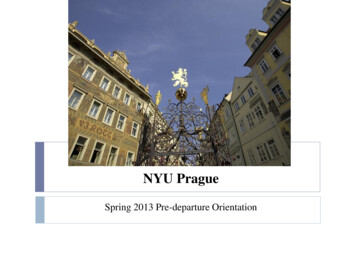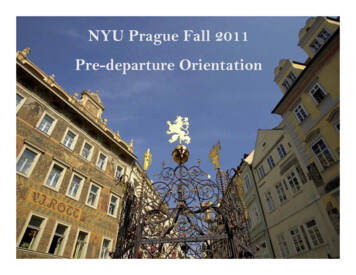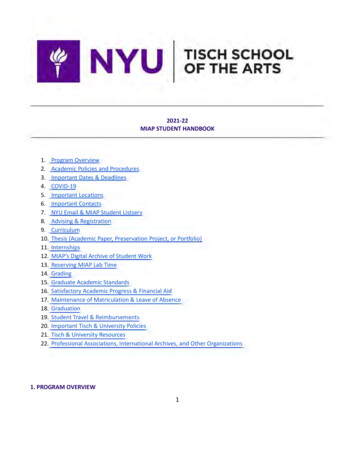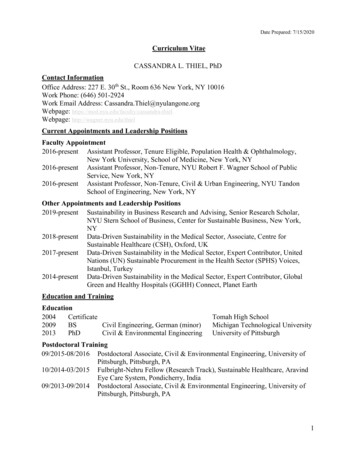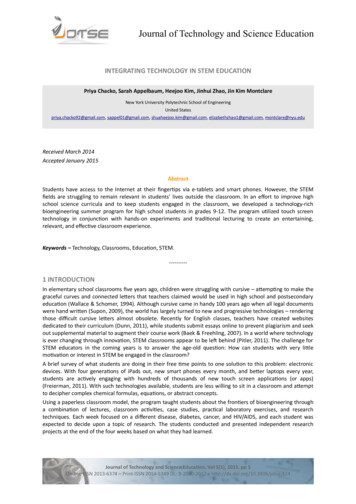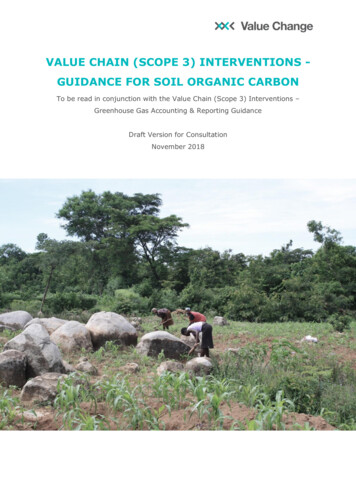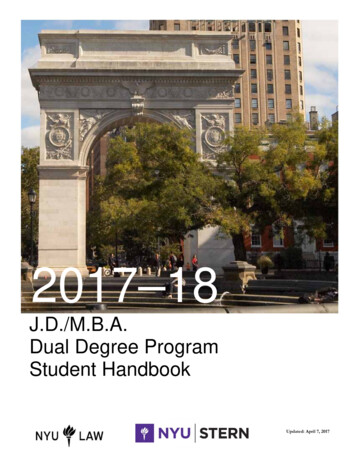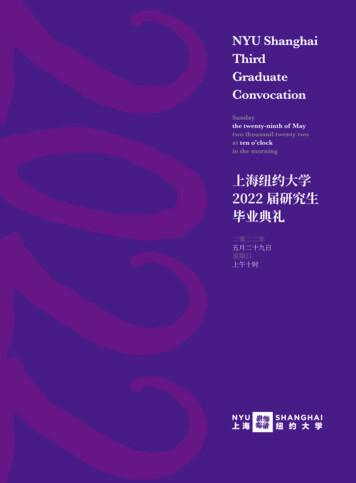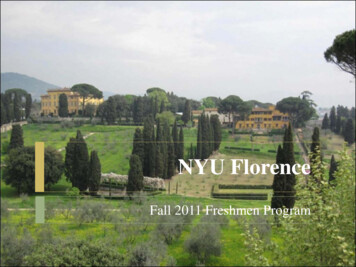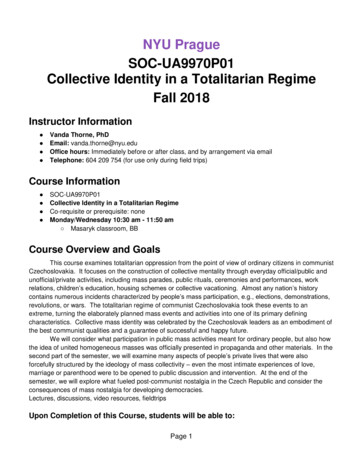
Transcription
NYU PragueSOC-UA9970P01Collective Identity in a Totalitarian RegimeFall 2018Instructor Information Vanda Thorne, PhDEmail: vanda.thorne@nyu.eduOffice hours: Immediately before or after class, and by arrangement via emailTelephone: 604 209 754 (for use only during field trips)Course Information SOC-UA9970P01Collective Identity in a Totalitarian RegimeCo-requisite or prerequisite: noneMonday/Wednesday 10:30 am - 11:50 am Masaryk classroom, BBCourse Overview and GoalsThis course examines totalitarian oppression from the point of view of ordinary citizens in communistCzechoslovakia. It focuses on the construction of collective mentality through everyday official/public andunofficial/private activities, including mass parades, public rituals, ceremonies and performances, workrelations, children’s education, housing schemes or collective vacationing. Almost any nation’s historycontains numerous incidents characterized by people’s mass participation, e.g., elections, demonstrations,revolutions, or wars. The totalitarian regime of communist Czechoslovakia took these events to anextreme, turning the elaborately planned mass events and activities into one of its primary definingcharacteristics. Collective mass identity was celebrated by the Czechoslovak leaders as an embodiment ofthe best communist qualities and a guarantee of successful and happy future.We will consider what participation in public mass activities meant for ordinary people, but also howthe idea of united homogeneous masses was officially presented in propaganda and other materials. In thesecond part of the semester, we will examine many aspects of people’s private lives that were alsoforcefully structured by the ideology of mass collectivity – even the most intimate experiences of love,marriage or parenthood were to be opened to public discussion and intervention. At the end of thesemester, we will explore what fueled post-communist nostalgia in the Czech Republic and consider theconsequences of mass nostalgia for developing democracies.Lectures, discussions, video resources, fieldtripsUpon Completion of this Course, students will be able to:Page 1
Evaluate the main theoretical concepts and historical events of totalitarianism against thebackground of specific activities and experiences of Czechoslovak people.Critically analyze the consequences of life in a totalitarian regime.Contrast and compare the classic Western theories of the masses with Eastern European officialand unofficial texts about mass mentality.Demonstrate the ability to research and analyze historical phenomena, using academic texts as wellas analyses of fiction, propaganda materials, samizdat and censured writing.Course RequirementsClass ParticipationActive class participation is necessary for this type of course; therefore, it will form a considerable part ofa student’s grade (20%). You are expected to ask questions and/or comment on the issues discussedfrequently. Short response papers or home assignments (max. 1 page) will be assigned by theprofessor throughout the semester to assess students’ knowledge of the specific phenomena covered indiscussions, films and readings.Reading PresentationsEach student will be asked to present 2 readings from the assigned list according to her/his choice over thecourse of the semester. At least 1 presentation is due before the Midterm. More than 1 person, but nomore than 3 people, can present the same article (please note that in the case of short texts it is notadvisable to have more than 2 people presenting the same reading). As a discussion facilitator, you willshortly introduce the reading (max. 2-3 minutes) and then focus on your evaluation of it (max. 10 minutes).Your task is to present your own arguments and/or comments regarding the key points discussed in thetext. Come prepared with a written short summary of the text and at least half a page of your owncommentary and questions or thought-provoking points that you wish to make about the reading.Please make enough copies for class distribution. Your written and spoken presentation should be focusedand to the point; avoid lengthy quotations. The goal is to stimulate discussion of the readings and to makeconnections with previous class topics. Each presentation will be worth 10% of the final grade (5% for thequestions/points sheet, 5% for the verbal presentation of the reading). Please note, however, that allstudents, not just the discussion facilitators, are expected to read and discuss the assigned readingeach week.Written AnalysisMinimum 5 pages, double spaced, with bibliography. In-depth analysis of one of the class topics or one ofthe assigned films. You should demonstrate your knowledge of previously read class materials, relate youranalysis to the relevant historical, cultural and social phenomena that we discussed, and provide evidenceof your own independent thinking. Please follow standard citation criteria.Tests & QuizzesMidterm test and Final test (in-class written tests)Failure to submit or fulfill any required course component results in failure of the class.Page 2
Grading of AssignmentsThe grade for this course will be determined according to the following formula:Assignments/Activities% of Final GradeClass participation/attendance/shortresponse papers20%2 Reading Presentations (one due beforeMidterm)20%Midterm Test (in-class written test, October29)20%Written Analysis (5 pages, December 12)20%Final Test (in-class written test, December17)20%Letter GradesLetter grades for the entire course will be assigned as follows:Letter GradePercentA94% - 100%A-90% - 93%B 87% - 89%B84% - 86%B-80% - 83%C 77% - 79%C74% - 76%C-70% - 73%D 67% - 69%D65% - 66%FBelow 65Assessment ExpectationsGrade A: Excellent work. Demonstrates an exceptional understanding of the topic and an active andcritical approach to the subject. Written work shows original thought and research and an ability to expressideas clearly and persuasively.Grade B: Very good work. Frequently participates in class discussions and shows some insight. Writtenwork is well structured and researched but falls short of the highest level.Grade C: Satisfactory work. Has done necessary class work but lacks individual insight and active classinvolvement. Written work accurate but not original or critical.Page 3
Grade D: Passable work. Meets minimum requirements.Grade F: Fails to meet the requirements.Course ScheduleTopics and AssignmentsWeek/DateTopicSession 1Monday,September 3Overview of course.Definitions of BasicConcepts. Historical andSocial Background toTotalitarianism in CentralEurope.Session 2Wednesday,September 5Lecture: PropagandaSession 3Monday,September10Text analysis anddiscussion: Theories andImages of PropagandaSession 4Wednesday,September12Session 5Monday,September17Session 6Film analysis anddiscussion: Power andControl in a TotalitarianSystemLecture: WesternTheories of the Masses –Are They Applicable inthe Context of EasternEuropean CommunistSystems?Text analysis anddiscussion: WesternTheories of the MassesStudy MaterialsAssignment DueNo readingArendt, Hannah. “A ClasslessSociety,” in Totalitarianism, pp. 324 (21 pages)Clark, Toby. “Propaganda in theCommunist State,” in Art andPropaganda in the TwentiethCentury, pp. 72-101Ellul, Jacques. “TheCharacteristics of Propaganda,” inPropaganda: The Formation ofMen’s Attitudes, pp. 3-24Molloy, Peter. “Hero Workers,” inThe Lost World of Communism: AnOral History of Daily Life Behindthe Iron Curtain, pp. 86-109Recommended:Taylor, Richard. “Propaganda andFilm,” in Film Propaganda. SovietRussia and Nazi Germany, pp. 717.(73/83 pages)SIGN UP FORREADINGPRESENTATIONSIn-Class Analysis ofthe Nazi, Soviet andCzechoslovakpolitical propagandaFilm: The Lives of Others(Das Leben Der Anderen)In-Class WorksheetNo readingThe Lives of OthersWorksheets due onNYU ClassesLe Bon, Gustave. “The Mind ofCrowds – General Characteristicsof Crowds,” in The Crowd: A Studyof the Popular Mind,Page 4
Week/DateTopicWednesday,September19Study Materialspp. 1-9Ortega y Gasset, Jose. “TheComing of the Masses” and “Whythe Masses Intervene inEverything, and Why TheirIntervention Is Solely by Violence,”in The Revolt of the Masses, pp.11-18 and 68-77Canetti, Elias. “The Crowd (TheFear of Being Touched – TheAttributes of the Crowd),” in TheCrowd: A Study of the PopularMind, pp. 15-30(39 pages)Session 7Monday,September24Lecture: The Ideology ofCollective Identity inCzechoslovakiaNo readingSession 8Wednesday,September26Field Trip: NationalMemorial VitkovNo readingText analysis anddiscussion: Public andPrivate Aspects ofImposed CollectiveMentality inCzechoslovakiaHavel, Vaclav. “Letter to Dr GustavHusak, General Secretary of theCzechoslovak Communist Party,”in Living in Truth, pp. 3-35.Ash, Timothy Garton.“Czechoslovakia Under Ice,” in TheUses of Adversity: Essays on theFate of Central Europe, pp. 55-63.Margolius Kovaly, Heda. PragueFarewell, pp. 90-123.(73 pages)Lecture: Official MassCeremonies andPerformancesNo readingText analysis anddiscussion: Participationin Organized MassEventsBakhtin, Mikhail. “Introduction,” inRabelais and His World, pp. 1-36.Scott, James C. “The PublicTranscript as a RespectablePerformance,” in Domination andthe Arts of Resistance: HiddenTranscripts, pp. 45-69.Bojar, Tomas, Jan Trestik, andJakub Zelnicek, (eds.) “With LeninForever,” in Power of Images,Images of Power, pp. 111-145.(93 pages)Session 9Monday,October 1Session 10Wednesday,October 3Session 11Monday,October 8Page 5Assignment Due
Week/DateSession 12Wednesday,October 10October 1321TopicLecture: Collectivizationof Life in the PrivateSphere. Spending FreeTime with the Masses –Weekend Housing andVacationingStudy MaterialsAssignment DueNo readingFall BreakSession 13Monday,October 22Text analysis anddiscussion: Constructionof the Socialist Home.Collective VacationingDrakulic Slavenka. “On DoingLaundry,” in How We SurvivedCommunism and Even Laughed,pp. 43-54.Crowley, David. “WarsawInteriors: The Public Life of PrivateSpaces, 1949-65,” in SocialistSpaces, pp. 181-206.Margolius Kovaly, Heda. PragueFarewell, pp. 63-80.Bren, Paulina. “The Chata, theTramp and the Politics of PrivateLife in Post-1968 Czechoslovakia,”in Socialist Spaces, pp. 123-140.(70 pages)Session 14Wednesday,October 24Field Trip: 100 Years ofTramping (NationalMuseum)Session 15Monday,October 29MIDTERM TESTSession 16Wednesday,October 31Film analysis anddiscussion: DomesticSpace and PoliticsFilm: Pelisky (Cosy Dens)In-Class WorksheetSession 17Monday,November 5Lecture: MassGymnastics as aCollective PerformanceNo readingThe Cosy DensWorksheets due onNYU ClassesText analysis anddiscussion: DisciplinedCommunist BodiesFoucault, Michel. “Docile Bodies,”in Discipline and Punish: The Birthof the Prison, pp. 135-169.Dano, Orsolya and Petr Roubal,(eds.) Bodies in Transformation.Mass Gymnastics underCommunism, pp. 1-22.(55 pages)Start reading TheWall (Petr Sis) –copies in the librarySession 18Wednesday,November 7Make-up DayFriday,Make-up day for missedNovember 9 classes(9am-5pm)Page 6
Week/DateTopicStudy MaterialsSession 19Monday,November12Field Trip: StrahovStadiumNo readingSession 20Wednesday,November14Lecture: Children as thePerfect SocialistCollectiveSis, Peter. The Wall: Growing UpBehind the Iron Curtain.(48 pages)Session 21Monday,November19Film analysis anddiscussion: Children asModel Citizens?Film: Občanský průkaz (IdentityCard)Session 22Wednesday,November21Lecture: Women and Menas UnanimousCollectives – GenderAspects of CollectiveIdentityNo readingText analysis anddiscussion: Ideology andReality of EnforcedEqualityHavelkova, Hana. “Women in andafter a ‘Classless’ Society,” inWomen and Social Class –International FeministPerspectives, pp. 69-82.Marx Ferree, Myra. “Patriarchiesand Feminisms: The Two Women’sMovements of Post-UnificationGermany,” in Crossing Borders:Gender and Citizenship inTransition, pp. 159-178.Einhorn, Barbara. “New for Old?Ideology, the Family and theNation,” in Cinderella Goes toMarket: Citizenship, Gender andWomen’s Movements in EastCentral Europe, pp. 39-73.(66 pages)Film analysis anddiscussion: N(Ost)algiafor Communism?Film: Goodbye LeninLecture: N(Ost)algia forCommunism?Text Analysis andDiscussion: Nostalgia inCentral European ContextBoym, Svetlana. “Nostalgia andPost-Communist Memory,” in TheFuture of Nostalgia, pp. 57-71.Thorne, Vanda. “CzechCommunist Nostalgia in anImmature Democracy,” inTransitions Online. (Feb. 10, ession 23Monday,November26Session 24Wednesday,November28Session 25Monday,December 3Page 7Assignment DueIn-Class WorksheetIn-Class Worksheet
Week/DateTopicStudy MaterialsAssignment Due(15 pages)Session 26Wednesday,December 5Field Trip: Museum ofCommunismSession 27Monday,December10Film Analysis:Contemporary AntiCommunist Satire (andthe Communist Backlashto It)Session 28Wednesday,December12(last day ofclasses)Final Summary of theCourseSession 29Monday,December17FINAL TESTSession 30Wednesday,December19Individual ReviewsFilm: The Death of StalinIn-Class WorksheetNo readingWRITTENANALYSIS DUECourse MaterialsRequired Textbooks & Materials (in chronological order): Arendt, Hannah. Totalitarianism (Harcourt Brace & Company: 1968), 978-0156701532Clark, Toby. Art and Propaganda in the Twentieth Century (Harry N. Abrams, Inc. Publishers: 1997),978-0810927131Ellul, Jacques. Propaganda: The Formation of Men’s Attitudes. (Vintage Books: 1973 [1965]), 9780394718743Molloy, Peter. The Lost World of Communism: An Oral History of Daily Life Behind the Iron Curtain.(BBC Books: 2009), 978-1785940255Taylor, Richard. Film Propaganda: Soviet Russia and Nazi Germany. (I. B. Tauris Publishers: 1998),978-1860641671Le Bon, Gustave. The Crowd: A Study of the Popular Mind. (The Viking Press: 1896/1960), 9780486419565Ortega y Gasset, Jose. The Revolt of the Masses. (Norton: 1930/1993), 978-0393310955Canetti, Elias. The Crowd: A Study of the Popular Mind. (Dover Publications: 2002), 9780486419565Havel, Vaclav. Living in Truth. (Faber and Faber: 1986), 978-0571144402Page 8
Ash, Timothy Garton. The Uses of Adversity: Essays on the Fate of Central Europe. (PenguinBooks: 1999), 978-0140283921Margolius Kovaly, Heda. Prague Farewell. (Indigo: 1997), 978-0575400863Bakhtin, Mikhail. Rabelais and His World. (Indiana University Press: 1984), 978-0253203410Scott, James C. Domination and the Arts of Resistance: Hidden Transcripts. (Yale University Press:1990), 978-0300056693Bojar, Tomas, Jan Trestik, and Jakub Zelnicek (eds). Power of Images, Images of Power. (Galerieu Krizovniku: 2005), 802-3943103Drakulic Slavenka. How We Survived Communism and Even Laughed. (Norton: 1991), 9780393030761Crowley, David. Socialist Spaces. (Berg: 2002), 978-1859735381Foucault, Michel. Discipline and Punish: The Birth of the Prison. (Vintage Books: 1995), 9780679752554Dano, Orsolya and Petr Roubal, (eds.) Bodies in Transformation. Mass Gymnastics underCommunism. (Open Society Archives at Central European University: 2001), 963- 8523069Sis, Peter. The Wall: Growing Up Behind the Iron Curtain (Frances Foster Books: 2007), 9780374347017Zmroczek, Christine. and Pat Mahony (eds.) Women and Social Class – International FeministPerspectives. (Taylor and Francis/UCL: 1998), 978-1857289305Hobson, Barbara and Anne Marie Berggren (eds.) Crossing Borders: Gender and Citizenship inTransition. (Swedish Council for Planning and Coordination: 1997), 3840175Einhorn, Barbara. Cinderella Goes to Market: Citizenship, Gender and Women’s Movements in EastCentral Europe. (Verso: 1995), 978-0860916154Boym, Svetlana. The Future of Nostalgia. (Basic Books: 2001), 978-0465007080Thorne, Vanda. “Czech Communist Nostalgia in an Immature Democracy,” in Transitions Online.(Feb. 10, 2014).All required texts are included in the Course Reader (available in the library) or on NYU Classes. Pleasenote that some texts will be only available in an electronic format on NYU Classes. Petr Sis’s bookThe Wall: Growing Up Behind the Iron Curtain is available in the NYU Library.Resources Access your course materials: NYU Classes(nyu.edu/its/classes)Databases, journal articles, and more: Bobst Library (library.nyu.edu)Assistance with strengthening your writing: NYU Writing Center (nyu.mywconline.com)Obtain 24/7 technology assistance:IT Help Desk (nyu.edu/it/servicedesk)NYU Prague library:Tritius Catalog (https://nyu.tritius.cz/?lang EN)Course PoliciesAttendance and TardinessAbsences only for medical reasons and for religious observance will be excused. To obtain an excusedabsence, you are obliged to supply either a doctor’s note or corroboration of your illness by a member ofthe housing staff (either an RA or a Building Manager). To be excused for religious observance, you mustcontact the instructor and the Academic Director via e-mail one week in advance of the holiday. YourPage 9
absence is excused for the holiday only and does not include days of travel associated with the holiday.Unexcused absences will be penalized with a 2% percent deduction from your final course grade for everyweek of classes missed.Please note that Friday, November 9 (9am – 5pm) is reserved as a make-up day for missed classes.Do not schedule any trips for this day.Late Submission of WorkAll assigned written work is to be submitted by the proper deadline. Any late submission will be penalizedby deducting 5% from the assignment grade for each day of the delay. Written assignments will not beaccepted for grading if delivered more than 10 days after the original deadline.Students are permitted to reschedule their reading presentation once per semester without penalty. Anyfurther rescheduling will result in a penalty of 5 points on the 100 point scale for each rescheduled reading.Academic Honesty/PlagiarismAccording to the Liberal Studies Program Student Handbook, plagiarism is defined as follows:Plagiarism is presenting someone else’s work as though it were one’s own. More specificallyplagiarism is to present as one’s own a sequence of words quoted without quotation marks fromanother writer, a paraphrased passage from another writer’s work; facts or ideas gathered,organized and reported by someone else, orally and/or in writing. Since plagiarism is a matter offact, not of the student’s intention, it is crucial that acknowledgment of the sources be accurate andcomplete. Even where there is no conscious intention to deceive, the failure to make appropriateacknowledgment constitutes plagiarism.The College of Arts and Science’s Academic Handbook defines plagiarism similarly and also specifies thefollowing:“presenting an oral report drawn without attribution from other sources (oral or written), writing aparagraph which, despite being in different words, expresses someone else’s idea without areference to the source of the idea, or submitting essentially the same paper in two differentcourses (unless both teachers have given their permission in advance).Receiving help on a take-home examination or quiz is also cheating – and so is giving that help –unless expressly permitted by the teacher (as in collaborative projects). While all this looks like a lotto remember, all you need to do is give credit where it is due, take credit only for original ideas, andask your teacher or advisor when in doubt.”“Penalties for plagiarism range from failure for a paper, failure for the course or dismissal from theuniversity.” (Liberal Studies Program Student Handbook)Classroom EtiquetteEating is not permitted in the classroom. No cell phones and no use of the Internet for other thaneducational purposes in the classroom. Tardiness of more than 20 minutes without a reasonableexcuse will be regarded as an absence.Disability Disclosure StatementAcademic accommodations are available for students with disabilities. Please contact the Moses Center forStudents with Disabilities (212-998-4980 or mosescsd@nyu.edu) for further information. Students who arerequesting academic accommodations are advised to reach out to the Moses Center as early as possible inthe semester for assistance.Page 10
NYU Prague SOC-UA9970P01 . relations, children's education, housing schemes or collective vacationing. Almost any nation's history contains numerous incidents characterized by people's mass participation, e.g., elections, demonstrations, revolutions, or wars. The totalitarian regime of communist Czechoslovakia took these events to an
